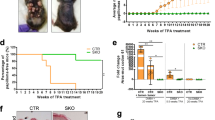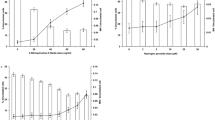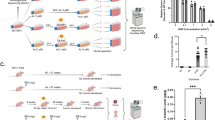Abstract
BENZO[a]PYRENE (BP) is one of a group of chemically inert carcinogens which, in order to exert their cytotoxic, mutagenic and carcinogenic effects, require metabolic activation by mixed function oxygenases (MFC) to products capable of covalent reaction with cellular macromolecules1–3. More specifically, it has been shown in mouse skin4 and various cultured mammalian cells5, that, in the case of DNA, the extent of this reaction correlates with the carcinogenic potency of the compound. The hypothesis that DNA is the important target for this series of hydrocarbons is further supported by evidence that the most carcinogenic members are also the most mutagenic towards hamster cells in vitro1. Here we present evidence that a diol epoxide derivative of BP is a powerful mutagen when applied to mammalian cells, and suggest therefore that this compound is the ultimate carcinogenic metabolite of BP.
This is a preview of subscription content, access via your institution
Access options
Subscribe to this journal
Receive 51 print issues and online access
$199.00 per year
only $3.90 per issue
Buy this article
- Purchase on Springer Link
- Instant access to full article PDF
Prices may be subject to local taxes which are calculated during checkout
Similar content being viewed by others
References
Huberman, E., Mutation Res., 29, 285–291 (1975).
Kinoshita, N., and Gelboin, H. V., Cancer Res., 32, 1329–1339 (1972).
Gelboin, H. V., Huberman, E., and Sachs, L., Proc. natn. Acad. Sci. U.S.A., 64, 1188–1194 (1969).
Brookes, P., and Lawley, P. D., Nature, 202, 781–784 (1964).
Brookes, P., and Duncan, M. E., Nature, 234, 40–43 (1971).
Sims, P., and Grover, P. L., in Adv. Cancer Res., 20, 165–274 (1974).
Sims, P., Grover, P. L., Swaisland, A., Pal, K., and Hewer, A., Nature, 252, 326–328 (1974).
Hulbert, P. B., Nature, 256, 146–148 (1975).
Beland, F. A., and Harvey, R. G., Chem. Commun., 84–85 (1976).
Huberman, E., Yamsaki, H., and Sachs, L., Int. J. Cancer, 14, 789–798 (1974).
Brookes, P., and Duncan, M. E., Mutation Res., 21, 107–118 (1973).
Newbold, R. F., Brookes, P., Arlett, C. F., Bridges, B. A., and Dean, B., Mutation Res., 30, 143–148 (1975).
Arlett, C. F., Turnbull, D., Harcourt, S. A., Lehmann, A. R., and Colella, C. M., Mutation Res., 33, 261–278 (1975).
Thacker, J., and Cox, R., Nature, 258, 429–431 (1975).
Wood, A. W., et al. Proc. natn. Acad. Sci., U.S.A., 72, 3176–3180 (1975).
Ehrenberg, L., in Chemical Mutagens, 2 (edit. by Hollaender, A.), 365–386 (Plenum, New York, London, 1971).
Author information
Authors and Affiliations
Rights and permissions
About this article
Cite this article
NEWBOLD, R., BROOKES, P. Exceptional mutagenicity of a benzo[a]pyrene diol epoxide in cultured mammalian cells. Nature 261, 52–54 (1976). https://doi.org/10.1038/261052a0
Received:
Accepted:
Issue Date:
DOI: https://doi.org/10.1038/261052a0
This article is cited by
-
PARP1 protects from benzo[a]pyrene diol epoxide-induced replication stress and mutagenicity
Archives of Toxicology (2018)
-
Carcinogen-specific mutational and epigenetic alterations in INK4A, INK4B and p53 tumour-suppressor genes drive induced senescence bypass in normal diploid mammalian cells
Oncogene (2013)
-
Acute effects of benzo[a]pyrene on liver phase I and II enzymes, and DNA damage on sea bream Sparus aurata
Fish Physiology and Biochemistry (2009)
-
Significance of various enzymes in the control of reactive metabolites
Archives of Toxicology (1987)
Comments
By submitting a comment you agree to abide by our Terms and Community Guidelines. If you find something abusive or that does not comply with our terms or guidelines please flag it as inappropriate.



